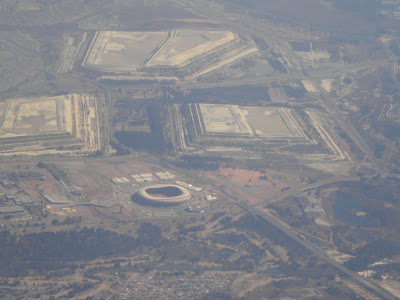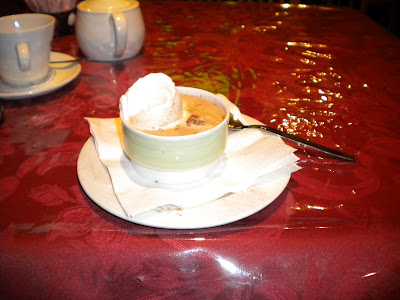
Grass fires near Johannesburg. 'Black frost' kills the grass when temperatures plummet, then on hot days, the grass ignites, fuelled by mustard grass which 'pops' as the seeds explode. Even playing fields and golf courses are burnt.

Soccer City in Joburg, which holds 95,000, will host the final on 11 July.
This Saturday, 26th June, is the one day of the trip which remained unplanned, because of the uncertainty whether I would go to Rustenburg to watch Australia. I had a flight from Cape Town to Joburg, nearest airport to Rustenburg, this morning, just in case. Then a flight tomorrow, Sunday, to London. With no game to attend, I now have an evening to kill in Joburg, and so I found some basic accommodation near the airport.
At Cape Town airport, I go to the medical centre, as now I have conjunctivitis to accompany my cough, and my left eye is weeping. The nurse takes one look at me and says my immune system has broken down. She takes me out the back and gives me a needle of something brown into my left buttock, then puts some antibiotics into my eye. Take it easy for a couple of days, she says. She gives me some pills and a cream for my eyes. This is the type of angel you need when your own angel is not around.
The flight to Joburg is notable for the fact that I only have half a seat: it’s supposed to be Seat 2B, but it’s really Seat 2B/2, because the very large woman in Seat 2A+2B/2 is hanging well over the arm rest. I don’t mind her taking the arm rest, it’s the chunk of her over my side that’s the worry. I squeeze into the remaining bit, and her right arm is surprisingly mushy. It feels more like a loosely-filled bean bag than part of a human. Debbie has a body of pure steel in comparison.
What to do? She doesn’t seem to mind that we’re bumped up against each other, and to make it worse, she fidgets a bit. Then I notice she’s reading the in-flight magazine, where the first advertisement is for the ‘Simply Slim’ Programme, which is ‘the catalyst that kick starts your body and directs you towards a healthier lifestyle. A life style you deserve.’ Before there’s any sign that she feels deserving, the magazine is put away.
I lean against her but she spreads rather than moves. There’s more blubber on my side than in your average Tokyo fish market. She plays a Sudoku on her iphone, then puts it away by tucking it into the bra cup of her left breast. Man, she could fit a lap top computer in there, maybe a small Dick Smith store at a pinch.
She puts a pillow against the window, and to improve her position, shifts slightly onto her left buttock, moving my way even further. I’ve heard of continental drift, but this is ridiculous. Africa will soon spread over Australia at this rate. I then think about doing the same, using her mattress-like right arm to rest my weary head. I have an image of me nuzzling into her cleavage and disappearing, never to be seen again.
She gives up trying to sleep and takes out a bible. Now I’ve got no chance after what I said about Jesus playing football (did I mention when Heaven was playing Hell, Jesus received the ball on half-way, did a little step-over to beat the Devil, played a lovely through ball to Paul, who on spotting Peter by the far post, crossed the ball (literally), then crossed the ball properly, and Peter met it beautifully and headed it into the net. One hell of a goal). It’s a well-worn bible, and she reads it with great concentration.
Then a cough a little, and she gives me a dirty look. How dare she! I’ve spent most of the last three days nurturing that cough. I went out one day in the heat, then another in the cold, got wet, sat in confined spaces for hours, mixed with unhealthy people on buses and planes, sat in the top tier of a stadium while the wind came in. Last night, I was awake for hours hacking it to perfection. The only reason we’re sitting so close is that her right arm has its own excess baggage allowance.
Speaking of which, isn’t it strange they are so strict on baggage weight, allowing only 20kg in the hold and 7kg in the cabin, and the person can be 150kg or 50kg without comment. Fair enough, let’s not be weightist, but it’s not great when you’re in the next seat.
Anyway, she keeps me warm in the same way Eskimos survive winter by snuggling together, and we soon arrive at Joburg where a forklift truck and lunch awaits her.
On arrival in Joburg, I go directly to Etihad to try to change my flight to London to today, because I have finally hit the ‘stuff up’ moment. I thought from the start that these plans were so complex with 80 hours of flying and as much spent in transit that something would go wrong, and it has: my flight from Joburg to London leaves at 1:30pm Sunday, and England v Germany starts at 3:00pm. Damn.
Unfortunately, all 240 economy seats are taken by existing bookings. Sheesh – not even a decent traffic jam or family crisis to hold up a passenger just when you need one. There is one business class seat for an additional R18,000. That’s $3,000 to sit in a pub in England and watch the game on TV. Even I’m not that desperate.
So I transfer to a humble B&B place on a sort a farm outside Joburg and settle in for a couple of matches, and some rest as the lovely nurse ordered. And the owner, a lady called Peta, who is enjoying all the business the WC is bringing her way (“We brought in these Indian builders to improve the place, but they ripped me off”), offers to make me dinner – probably a chickenny thing with some vegetables, she says. Wow, tempt me – which I accept, because there’s nowhere else to go, even though I know I’ll regret it.
Then I'm saved by meeting a couple who are going to a Portuguese restaurant in the next town, and they ask me to join them. They're a curious couple: he's a Namibian farmer who's lived all over the world, including three years owning a garage in Gladstone, Queensland. He travels around Africa, often in a campervan he built himself (with a 220 litre tank and a diesel engine). She's his Russian girlfriend, comes from a place near Moscow, speaks little English, but enough to tell me she teaches piano and writes poetry. When we order food, his way of translating the menu is to read every item in English, only slowly and loudly, as if slow and loud is a babel fish. It takes 30 mins to do the menu, accompanied by actions that describe certain animals. I try not to laugh, and after all that, she orders a salad. I must have missed the lettuce action. But he's an interesting guy when I can stop coughing in his face long enough to listen.
Back at my modest digs, the owner explains there's no internet access because someone stole the copper wiring outside the property. And it's not until morning, when I come to shave, that I realise they've also nicked the bathroom mirror. In fact, there's not a mirror in the entire room, and shaving in front of the television is not ideal. Fortunately, I've got a good memory for faces.












































